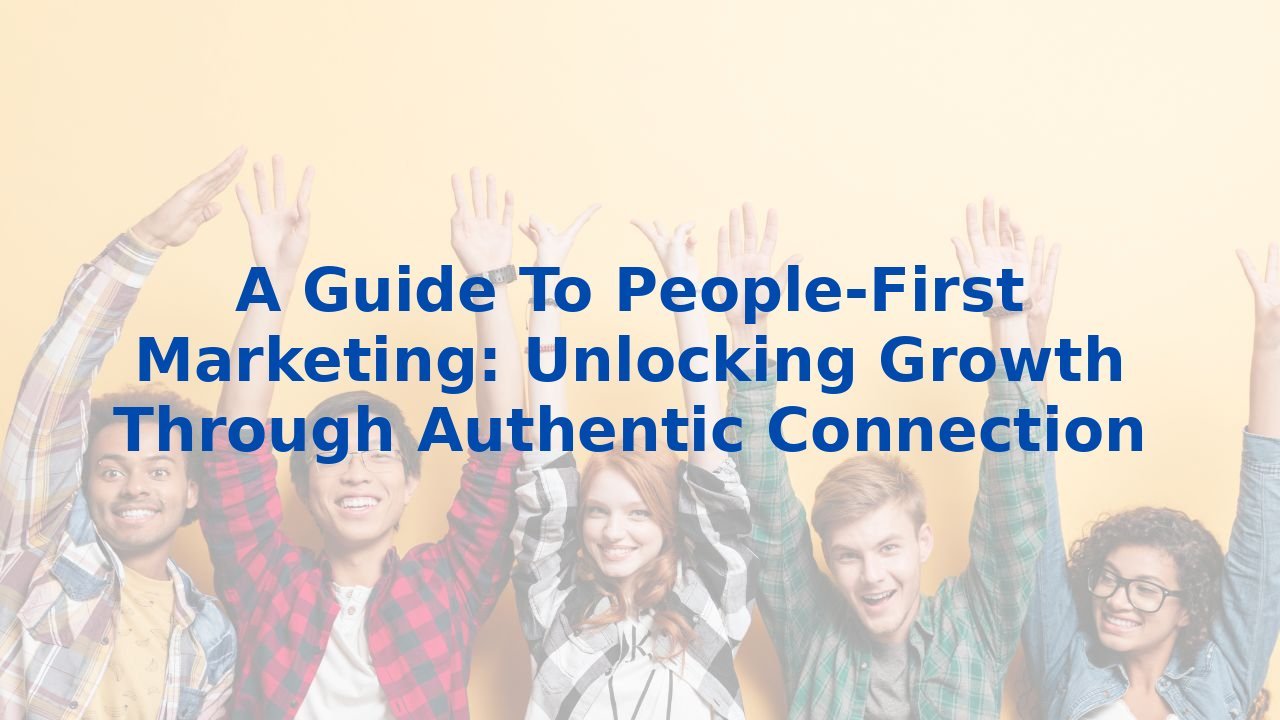A Guide To People-First Marketing: Unlocking Growth Through Authentic Connection
A Guide To People-First Marketing: Unlocking Growth Through Authentic Connection
In an era where consumers are bombarded with options, the path to sustainable growth lies not in aggressive sales tactics but in fostering authentic connections. People-first marketing advocates for an approach that prioritizes genuine engagement with consumers, leading to loyalty, trust, and ultimately, revenue growth. Here, we’ll explore the essential business processes involved in this strategy and how AI can enhance each facet, resulting in improved efficiency across the organization.
The Heart of People-First Marketing
At the foundation of people-first marketing is the recognition that behind every transaction is a person with unique needs, values, and emotions. Understanding your audience deeply—beyond mere demographics—is crucial. Businesses must engage in listening and observing to build rapport and trust. This can be achieved through market research, customer feedback loops, and data analysis that focuses on behavior rather than numbers alone.
AI can greatly enhance these processes by providing sophisticated analytics that reveal consumer insights at a granular level. Through advanced algorithms, AI can identify patterns in consumer behavior, enabling businesses to segment their audience effectively and tailor their messages accordingly. By employing AI-driven insights, organizations can ensure their messaging resonates, fostering the authentic connections that people-first marketing aims to achieve.
Crafting Personalized Experiences
Once businesses have a clear understanding of their audience, the next step is creating personalized experiences. Customization could range from targeted email campaigns to specialized customer service approaches. Here, the emphasis lies on fulfilling individual needs and enhancing the customer journey.
AI significantly streamlines this process. With machine learning, brands can develop recommendations that feel genuinely personal. For example, utilizing AI tools to analyze purchasing histories and preferences allows businesses to send personalized product suggestions to customers, drastically improving engagement rates.
"The goal isn't just to sell a product; it's to enrich lives with solutions that align perfectly with individual needs."
Building Authentic Engagement
Creating authentic engagement involves continual interaction with your audience—whether through social media platforms, message boards, or direct communications. It’s about transforming a transactional relationship into a dialogue built on trust and understanding.
This is where AI acts as an enhancer rather than a replacement for human connection. Tools like chatbots can manage customer inquiries, allowing organizations to provide 24/7 communication without losing the personal touch. They can be designed to reflect the brand’s voice, answering queries while maintaining engaging interactions. Furthermore, AI can provide valuable customer data to human agents, helping them tailor their responses and hone in on the most pressing customer needs.
Streamlining Operations Through AI
Efficient operational processes serve as the backbone of effective marketing strategies. When your operational model runs smoothly, it allows your marketing team to focus on higher-level strategic initiatives rather than getting bogged down by repetitive tasks.
AI enhances operational efficiency through automation of routine tasks. Consider uses like demand forecasting, inventory management, and performance tracking. By leveraging AI algorithms, businesses can optimize resources, reduce waste, and make informed decisions faster than ever. This translates into more time and energy devoted to crafting people-first marketing strategies that resonate deeply with the audience.
Empowering Your Team with AI Training
While integrating AI systems can provide significant advantages, training employees on these tools becomes essential. Investing in AI training programs can ensure that your team not only knows how to use these technologies effectively but also understands the philosophy of people-first marketing. When employees feel equipped with the right skills, they’re more confident in their ability to implement strategies that connect authentically with customers.
Furthermore, an organization committed to training its workforce for the future fosters innovation. Employees empowered with AI knowledge can think outside the box, coming up with new ways to engage customers on a personal level, all while utilizing data-driven insights to guide their efforts.
Conclusion: Authenticity as Your Winning Strategy
People-first marketing is not just a trend; it’s a fundamental shift in how businesses engage with their customers. By focusing on authentic connections, leveraging AI technologies to streamline processes, and empowering teams through comprehensive training, organizations can create a powerful, growth-driven dynamic. Ultimately, it’s about embracing the human element in marketing, where every interaction is an opportunity to build a lasting relationship rather than just another transaction. This path leads not only to customer loyalty but to truly meaningful growth.



